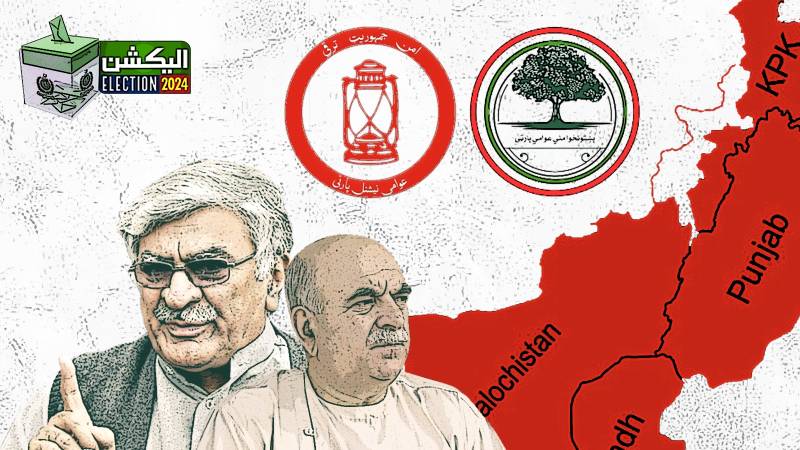
The 2024 elections bestowed a resounding mandate upon the Pakistan Tehreek-e-Insaf (PTI) in Khyber Pakhtunkhwa province for the third consecutive term, while the Pashtun Nationalist party Awami National Party (ANP) faced a notable setback in attracting voters. Similarly, the Pukhtunkhwa Milli Awami Party (PkMAP) in Baluchistan, led by Mehmood Khan Achakzai, also struggled to garner significant voter support. This decline in electoral performance raises critical questions about the future trajectory of Pashtun nationalism and its political representation. Several factors contribute to this phenomenon, shedding light on the challenges and dynamics shaping Pashtun politics in contemporary Pakistan.
While some analysts may attribute their lackluster performance to allegations of election rigging, the broader trend indicates a diminishing appeal of these parties against the backdrop of mainstream political forces.
One may ponder the factors that consistently lead Pashtun voters to reject Pashtun nationalist parties, despite their assertions of championing Pashtun rights.
According to Professor Shehryar Khan, an expert in International Relations at Iqra University, Islamabad, Pashtun nationalist parties find themselves bereft of significant political issues to champion. Many of the key issues they historically rallied around, such as Pashtun identity, regional autonomy, and linguistic rights, the construction of the Kalabagh Dam or the renaming of Khyber Pakhtunkhwa, have either been resolved or lost traction. Consequently, they struggle to offer fresh perspectives or agendas, with mainstream parties already monopolizing common concerns.
Moreover, Professor Khan highlights the failure of these parties to mobilize the youth demographic, a crucial and burgeoning segment of the electorate. While they may retain some of their traditional voter base, their inability to connect with and inspire new voters significantly impacts their electoral fortunes.
The absence of a clear vision and genuine commitment to the Pashtun nationalist cause becomes apparent when Pashtun nationalist parties readily align themselves with the Pakistan Muslim League-N, a party primarily representing the interests of Punjab.
In Professor Shehryar's view, Pashtun nationalist parties now face a critical need for introspection. They must confront why their slogans and platforms fail to resonate with the youth, signaling a necessary reassessment of their strategies and messaging.
Another significant factor contributing to the estrangement of emerging voters from these parties is their entrenched familial structure. These parties tend to prioritize familial hierarchies over cultivating new leadership, often confining key roles within their own kinship circles. This perpetuation of dynastic politics not only alienates segments of the electorate but also reinforces perceptions of elitism and exclusion within the party ranks.
Moreover, these parties face accusations of serving the interests, both political and financial, of specific families. In Khyber Pakhtunkhwa, the Bacha Khan family wields considerable influence within the ANP, while in Baluchistan, the Achakzai family holds similar sway. Critics argue that this concentration of power within a select few families undermines democratic principles and perpetuates dynastic politics, further diminishing their appeal among voters seeking genuine representation and accountability.
Political thinker Zakir Khan believes that the absence of a clear vision and genuine commitment to the Pashtun nationalist cause becomes apparent when Pashtun nationalist parties readily align themselves with the Pakistan Muslim League-N, a party primarily representing the interests of Punjab. This opportunistic alliance underscores a glaring contradiction, as these nationalist parties frequently accuse Punjab of exploiting the resources of Pashtun-majority areas in KP and Baluchistan.
This lack of consistency exposes the pragmatic rather than principled nature of their politics. Despite railing against Punjab's perceived dominance and resource exploitation, these parties demonstrate a willingness to compromise their purported ideals when it suits their familial or political interests. Such behavior undermines their credibility as authentic champions of Pashtun rights and reinforces perceptions of self-serving opportunism within their ranks.
During his post-election press conference, the provincial president and de facto leader of the ANP refrained from offering any insight into why his party failed to garner voter support. Instead, he chose to voice grievances towards the establishment, questioning why it did not allocate a share of power to the ANP.
Furthermore, these alliances with parties from outside their ethnic and regional spheres raise questions about the sincerity of their commitment to advancing the interests of the Pashtun community. By prioritizing short-term gains over long-term advocacy for Pashtun rights and autonomy, these nationalist parties risk further alienating their base and diminishing their relevance in the broader political landscape.
During his post-election press conference, the provincial president and de facto leader of the ANP refrained from offering any insight into why his party failed to garner voter support. Instead, he chose to voice grievances towards the establishment, questioning why it did not allocate a share of power to the ANP. Such a response exemplifies the current state of affairs within the foremost Pashtun Nationalist Party.
An Afghan TikToker, recognized by the moniker "General Mobeen," aptly characterizes the ANP as the party of the past, likening them to individuals persisting with lanterns in an era illuminated by electricity. This symbolic analogy resonates strongly, suggesting that the ANP remains entrenched in outdated ideologies and lacks a forward-looking vision for the future.
Looking ahead, the decline of Pashtun nationalist parties in Pakistan underscores the need for introspection and reform within the movement. To regain relevance and electoral viability, these parties must embrace inclusive leadership structures, prioritize pressing socio-economic issues, and adopt modern campaign strategies tailored to resonate with a diverse electorate. Additionally, addressing allegations of corruption and nepotism is imperative to restoring public trust and credibility.
The decline of Pashtun nationalist parties in the 2024 elections reflects broader challenges facing ethnic-based political movements in Pakistan. By addressing internal shortcomings and adapting to evolving societal dynamics, Pashtun nationalist parties can revitalize their appeal and play a meaningful role in advancing the interests of the Pashtun community within Pakistan's democratic framework.

